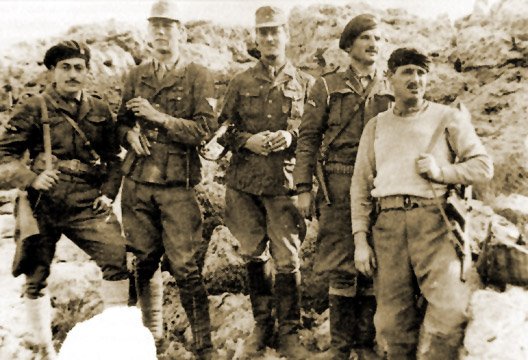Back in 1934, Patrick Leigh Fermor did something that most of us dream about doing and never do. He took a long walk across Europe with the goal of reaching Constantinople.
Scene from World War II (from left): Georgios Tyrakis, William Stanley Moss, Patrick Leigh Fermor, Emmanouil Paterakis, and Antonios Papaleonidas. Fermor is seen here less than ten years after his epic walk. (Photo credit: Wikimedia Commons).
He never made it the way he’d planned, but the journey produced two extraordinary books—A Time of Gifts and Between the Woods and the Water. The minute they appeared they became insta-classics.
He never quite reached Galicia either, but he did walk through parts of the forests of the Carpathian range, which stretch throughout the region and that are visible from my dad's village. I sometimes wonder what might have happened if he’d reached Galicia—maybe he would’ve met my dad, who was a boy of nine or ten when Fermor was on his trek.
Still, as a part of my collection of Ukrainian books, and as part of this series of blog posts about why Ukrainian literature means so much to me, Fermor’s two titles capture a sense of wonder and awe that no other region of the world has.
(Sure I know that's hyperbole, but wtf do I care? That’s how I feel about the damn place.)
When I first read Fermor back in the late ‘90s, it put me back in touch with my dad again (who'd died a few years before) in a special way. I thought of our own trip to Galicia, of the month we spent there and venturing out into the Carpathians, of the forests so thick and primeval and the air so pungent it made you slightly lose your mind.
Fermor makes a few occasional references to the Ruthenes (another name for the Ukes), the Hutsuls, and the awkward identity of the Uniates (that branch of Byzantine Christianity recognized by Rome that my dad was a member of). So that's a good enough reason to keep them with my other Ukrainian books.
We experienced plenty of moments like the following one that show you the peace and simplicity all Slavs share--at least until the Butcher of the Kremlin started lobbing bombs into these places like a coward:
An hour’s climb ended on the edge of a slanting field where a string of reapers were getting in the late upland harvest: biblical, white-clad countrymen and women in wide hats of plaited straw, some with babies slung across their backs like papooses; when they got in the way, they hung them in the shade, snugly laced into their wooden troughs. Baskets, water jars, sickles and rakes were heaped up, half-a-dozen ponies were grazing and conical bee-hives were set in rows along the edge of the enfolding trees. As they moved forward and reaped and gathered and gleaned, an old woman’s high quaver sang the lead of a never-ending sequence of verses to a grave and rather haunting tune; the others joined in each second line… I had heard it on the climb to the little plateau; it still floated up diminuendo long after the harvesters themselves had dropped out of sight….
Beautiful, right? We encountered similar scenes, more than 60 years later, on the outskirts of Striy and Kalush. And I'll never forget coming on Vasyl, the husband of our cousin, sitting out in a meadow by his house, watching his sheep graze. It was so friggen bucolic and beautiful everywhere that I never wanted to leave.
One more thing: Fermor didn’t start composing these two books about his travels until he was in his sixties. He must have had one helluva memory (and lots of detailed notebooks).
There’s a lesson about writing in that fact that I want to share—since this blog is supposed to be dedicated to writerly insights. That lesson boils down to one simple question: What’s your hurry?
Instead of hurrying to get a book done so you can add “author” to your LinkedIn profile, why not take longer and get it right? If you do, it might be remembered longer than some rush-into-print publishing service book that's going to cost you a bundle and fade away in a week.
Fermor's books took a long time to make — and like the singing he heard that day in the Carpathian uplands, they won’t soon be forgotten.
#freeukraine #Putinisawarcriminal
